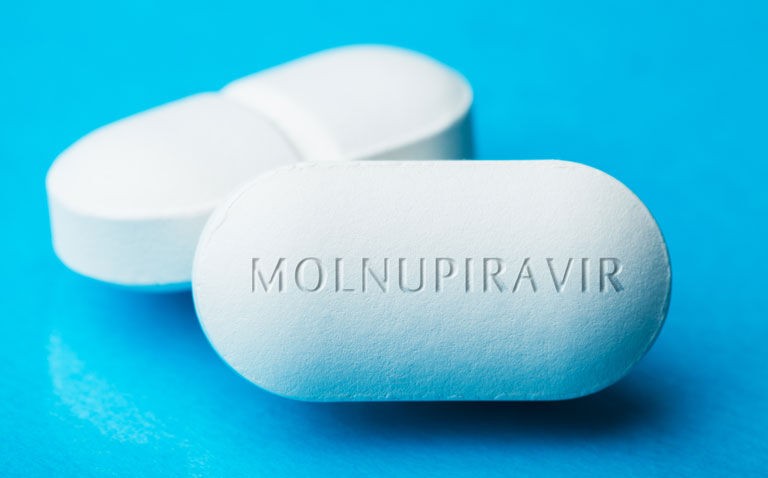Molnupiravir treatment improved recovery time in high-risk vaccinated patients with COVID-19 infections but not hospitalisation or death
In a 2019 study, it was reported that an anti-viral drug (EIDD-2801, molnupiravir)) was a clinical candidate with high potential for mono-therapy of seasonal and pandemic influenza virus infections. However, it was also recognised that the drug may have a role in the fight against COVID-19. In a phase 2a double-blind, placebo-controlled, randomised, multicentre clinical trial, molnupiravir treatment led to 92.5% of patients seeing viral RNA clearance compared to 80.3% of placebo recipients after 4 weeks. In fact, in this study, infectious virus was detected in swabs from 1.9% of the molnupiravir group compared with 16.7% of the placebo group after three days of treatment. Encouraged by these findings, a randomised trial in 1433 participants, found that molnupiravir treatment of unvaccinated patients who had at least one risk factor for severe COVID-19 illness, reduced the risk of hospitalisation or death.
But the value of molnupiravir among those who have been vaccinated was much less clear. As a result, for the present study, a team of UK researchers, the PANORAMIC Trial Collaborative Group, sought to determine the effectiveness of molnupiravir treatment at reducing all-cause, non-elective hospital admission and or death within 28 days among those with a higher risk of an adverse outcome following a breakthrough infection and who had been previously vaccinated against COVID-19. The study enrolled individuals 50 years of age and older or over 18 years but with co-morbidities and with COVID-19 symptoms with an onset of no longer than 5 days and a PCR positive COVID-19 test result. Participants were randomised 1:1 and stratified by age (< or > 50 years) and vaccination status (yes/no) to receive usual care and molnupiravir 800 mg twice daily for 5 days or usual care alone. Enrolled patients were then followed for 28 days after randomisation. In addition, there was a virology subgroup who provided daily nasopharyngeal swabs for the first 7 days and then on day 14. The primary outcome was all-cause hospital admission and or death within 28 days of randomisation. Secondary outcomes included the time to self-reported recovery (TTR) and the researchers also examined differences in the level of virus reported on day 7 and mean viral load for participants in the virology subgroup.
Molnupiravir treatment and COVID-19 outcomes
A total of 25,783 participants with a mean age of 56.6 years (58.6% female) were included and randomised to molnupiravir (12,962) or usual care. Overall, 68.9% of the cohort had co-morbidities and 98.9% had at least one dose of a COVID-19 vaccine and 93% had received three doses of a vaccine.
The primary outcome occurred in 0.8% of both groups (adjusted odds ratio, aOR = 1.06, 95% CI 0.80 – 1.40) and there were no differences in the subgroups.
The median time to first recovery from randomisation was 9 days in the molnupiravir group and 15 in the usual care group, giving an estimated benefit of 4.2 days (95% CI 3.8 – 4.6 days). Moreover, this effect was consistent across the subgroups.
In the virology cohort on day 7, COVID-19 was below the detection limit in 21% of those receiving molnupiravir and 3% in the usual care group (p = 0.039) and the mean viral load was also significantly lower (3.82 vs 4.93, p < 0.001).
The authors concluded that while molnupiravir treatment did not reduce the risk of hospitalisation or death (although this was already very low), the drug did result in a faster recovery time and a reduced viral detection and load.
Citation
Butler CC et al. Molnupiravir plus usual care versus usual care alone as early treatment for adults with COVID-19 at increased risk of adverse outcomes (PANORAMIC): preliminary analysis from the United Kingdom randomised, controlled open-label, platform adaptive trial SSRN preprint 2022










